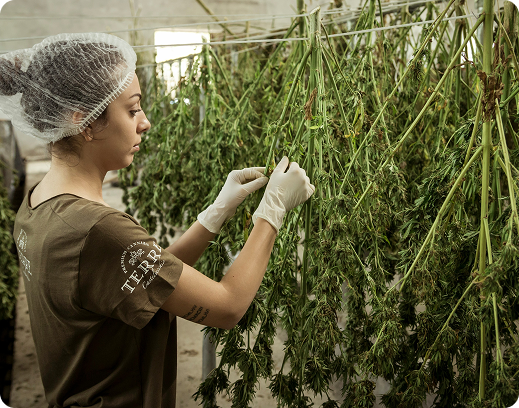How to Open a Dispensary in Rhode Island
Are you interested in tapping into the growing cannabis market in the USA? Look no further than Rhode Island, which has emerged as a promising destination for aspiring entrepreneurs with the legalization of recreational marijuana. With the market poised for growth, there are substantial opportunities for those seeking to establish themselves in this burgeoning industry.

Overview of Cannabis in Rhode Island
Cannabis in Rhode Island is legal for both medical and recreational use. The state has established a regulated market with dispensaries for medical cannabis. There are possession limits and regulations for cultivation, distribution, and consumption. Still, though, Rhode Island continues to evolve its cannabis industry and policies.
Why Start a Cannabis Business?
Opening a dispensary offers immense opportunities:
-
High Demand
With the growing acceptance of medical and recreational cannabis across multiple states and countries, dispensaries are seeing a surge in demand. Consumers are increasingly looking for high-quality products for health, wellness, and leisure, creating a constant need for reliable, accessible dispensaries.
-
Job Creation
The cannabis industry is projected to create thousands of jobs across various sectors, including cultivation, retail, logistics, and marketing. This growth not only provides employment opportunities but also contributes to local and national economies.
-
Strong ROI Potential
Entrepreneurs who navigate the complex regulatory landscape can make big returns on their investments. With proper business planning, branding, and compliance, dispensaries can tap into a rapidly growing market with high-profit margins.
Types of Dispensary Licenses in Rhode Island
In Rhode Island, the cannabis industry is regulated through various types of dispensary licenses. These licenses govern the sale and distribution of cannabis products. Understanding the different types of dispensary licenses is crucial for individuals and businesses looking to operate in the state’s cannabis market.
Conditional Adult-Use Retail Dispensary License (CAURD) in Rhode Island
The Adult-Use Dispensary License in Rhode Island is a special license that allows businesses to operate adult-use retail dispensaries. This license is granted to those who meet specific requirements and successfully complete the application process.
With a license, businesses can legally sell cannabis products to adults for recreational use. It’s an important license that ensures compliance with state regulations, including inventory tracking, security measures, and responsible sales practices.
Successful applicants must adhere to strict guidelines and follow all applicable laws to run their retail dispensaries and contribute to Rhode Island’s regulated cannabis market.

Other License Types for Cannabis in Rhode Island
- Cultivator License: Allows for the cultivation and production of cannabis plants.
- Product Manufacturer License: Permits the creation and manufacturing of cannabis-infused products.
- Testing Laboratory License: Ensures quality control and safety of cannabis products through testing and analysis.
- Transporter License: Allows for the transportation of cannabis between licensed facilities.
- Microbusiness License: Enables small-scale cultivation, manufacturing, and retail operations within a single facility.
- Cooperative License: Allows for the formation of cannabis cooperatives where multiple individuals can come together to cultivate, manufacture, or sell cannabis products.
- Research License: Permits research institutions and organizations to conduct scientific studies and research on cannabis.
- Hemp License: Allows for the cultivation and processing of hemp, which contains low levels of THC (tetrahydrocannabinol) and is primarily used for industrial purposes.
Understanding the Cannabis Market in Rhode Island
The cannabis market in Rhode Island is dynamic and evolving. With the legalization of both medical and recreational cannabis, the industry has gained momentum. The state’s medical cannabis program has established licensed compassion centers serving registered patients, providing access to a variety of therapeutic products.
The forthcoming adult-use market is expected to further expand the industry. The state is in the process of issuing licenses for dispensaries, cultivators, manufacturers, and other key players. Social equity programs aim to promote inclusivity and diversity in the industry.
With a growing number of municipalities approving cannabis businesses, Rhode Island’s cannabis market is poised for growth and economic opportunities.
Application Process for a Dispensary License
Steps Involved in Obtaining a License
The process of obtaining a dispensary license in Rhode Island involves several key steps.
- Research and Prepare: Familiarize yourself with the state’s regulations and requirements for dispensary licenses. Develop a comprehensive business plan and gather the necessary documents.
- Submit an Application: Complete the application form and provide all requested information, including financial records, security plans, and operational details.
- Background Checks: Undergo background checks for all individuals involved in the business, including owners, partners, and key employees.
- Site Inspection: The state will conduct a thorough inspection of the proposed dispensary location to ensure compliance with zoning and safety requirements.
- Review and Approval: The application will be reviewed by the appropriate regulatory authorities, and a decision will be made regarding license approval.
- Compliance and Operations: Once approved, adhere to all regulations and guidelines for operating a dispensary, including regular reporting and compliance with security and product handling protocols.
Note: that the specific steps and requirements may vary, so it is essential to consult the official guidelines and regulations provided by the Rhode Island Department of Business Regulation for accurate and up-to-date information.
Required Documentation for a License
- Completed application form
- Proof of identification for all individuals involved in the business (owners, partners, key employees)
- Proof of residency or business presence in Rhode Island
- A business plan outlining the proposed dispensary’s operations, marketing strategy, and financial projections
- Security plan detailing measures to ensure the safety and security of the dispensary premises, staff, and inventory
- Proposed floor plan and layout of the dispensary location
- Lease or ownership documents for the proposed dispensary location
- Financial records, including bank statements, financial statements, and tax returns
- Proof of compliance with zoning requirements and any necessary permits or licenses
- Proof of compliance with environmental and safety regulations
- Any additional documents required by the Rhode Island Department of Business Regulation as outlined in the application guidelines.
Timelines for Obtaining a License
The timeline for obtaining a cannabis dispensary license in Rhode Island can vary, but generally, the process takes several months. It involves submitting the application, undergoing background checks, and having a site inspection. The regulatory authorities then make a decision on license approval, which can take several weeks to several months.
Factors such as application preparation, review efficiency, and site inspection scheduling can influence the overall timeline. It’s important to be prepared for potential delays and to ensure all required documentation is in order to facilitate a smoother and timely licensing process.
Financing and Business Plan for a Dispensary
Obtaining adequate financing and developing a comprehensive business plan are essential steps when starting a cannabis dispensary. The financial aspects involve obtaining funding to cover expenses, while a well-crafted business plan outlines the dispensary’s operations, marketing strategies, financial projections, and compliance with regulations.
Types of Financing Available
- Traditional Business Loans: Local banks and financial institutions provide loans for cannabis dispensary operations, subject to federal regulations.
- Small Business Administration (SBA) Loans: SBA offers loans for ancillary businesses supporting the cannabis industry, such as equipment suppliers or consulting firms.
- State and Local Grants and Incentives: Governments provide grants, tax incentives, and financial assistance programs to promote economic growth and social equity within the cannabis sector.
- Private Investors and Venture Capital: Investors and venture capital firms may fund cannabis businesses, requiring a strong business plan and compliance with regulations.
- Cannabis-Specific Financing: Specialized lenders offer financing tailored to the cannabis industry, considering its unique challenges and regulations.
Importance of a Solid Business Plan
Having a solid business plan is crucial for a cannabis dispensary. It outlines the overall strategy, operational details, financial projections, and compliance with regulations. A well-crafted plan demonstrates the viability and sustainability of the business, attracting potential investors and lenders. It helps to identify potential challenges and develop strategies to overcome them.
A comprehensive business plan serves as a roadmap for the dispensary’s growth and success, providing a clear direction and guiding decision-making processes.
Risk Management Plan
A risk management plan is essential for a cannabis dispensary to identify and mitigate potential risks that could impact its operations and profitability. It involves assessing various risks, such as regulatory compliance, security threats, supply chain disruptions, financial uncertainties, and market fluctuations.
By implementing preventive measures, contingency plans, and insurance coverage, a comprehensive risk management plan helps protect the dispensary’s assets, reputation, and long-term sustainability. It also demonstrates the dispensary’s commitment to responsible business practices and enhances its ability to navigate challenges effectively.
Market Research and Location for a Dispensary
The cannabis industry in Rhode Island has experienced significant growth since the state legalized medical cannabis in 2006 and adult-use cannabis in 2022. As of now, there are five licensed compassion centers in the state that serve registered patients.
The forthcoming adult-use market is expected to further expand the industry. Understanding the market dynamics, trends, and competition is crucial for establishing a successful dispensary in Rhode Island.
Trends and Competition in the Rhode Island Cannabis Industry
The cannabis market in Rhode Island is competitive, with a growing number of dispensaries and cultivators. As of May 2023, the state has issued licenses for five adult-use retail dispensaries, with plans to issue additional licenses in the future.
Competition among dispensaries is expected to intensify as the market expands. It is important for entrepreneurs to conduct thorough market research to identify gaps and opportunities, and to differentiate their dispensary through unique product offerings, branding, and customer experience.
Location Requirements for a Dispensary
When selecting a location for a cannabis dispensary in Rhode Island, it is vital to adhere to specific regulations. Dispensaries must typically be situated in commercial or industrial zones and maintain certain distances from sensitive areas such as schools and parks. The required distance can vary, ranging from 200 to 1,000 feet.
Strict security measures, including surveillance and alarm systems, are necessary. Compliance with local zoning ordinances and accessibility requirements, including ample parking and adherence to ADA standards, is crucial.
It is essential to consult the Rhode Island Department of Business Regulation and local zoning authorities for precise details on location requirements and restrictions.
Insurance Requirements for a Dispensary
Operating a cannabis dispensary in Rhode Island comes with certain insurance requirements to protect the business from potential risks and liabilities. While specific requirements may vary, the following types of insurance policies are typically necessary:
Types of Policies Required
- General Liability Insurance: This policy provides coverage for third-party bodily injury, property damage, or personal injury claims that may arise on the premises of the dispensary.
- Product Liability Insurance: Given the nature of the cannabis industry, product liability insurance is crucial to protect against claims related to product defects, contamination, or adverse effects from the use of cannabis products.
- Property Insurance: This policy covers the dispensary’s physical assets, including the building, inventory, equipment, and fixtures, against risks such as fire, theft, vandalism, or natural disasters.
- Workers’ Compensation Insurance: If the dispensary employs staff, workers’ compensation insurance is typically required to provide coverage for work-related injuries or illnesses sustained by employees.
Coverage Limits
Dispensary owners should aim to obtain adequate coverage limits to safeguard their assets and liabilities effectively. According to industry data and sources, typical coverage limits for property insurance range from $500,000 to $1 million, depending on the value of the property and inventory.
General liability insurance may have coverage limits of $1 million to $5 million to protect against third-party claims.
Product liability insurance coverage limits can range from $1 million to $10 million to address potential risks associated with cannabis products. The number of employees can also impact coverage limits, with workers’ compensation insurance commonly requiring coverage of at least $500,000 per occurrence.
Costs Associated with Insurance
Determining the costs of insurance for a cannabis dispensary in Rhode Island involves various factors and can vary significantly. According to industry data, insurance premiums can range from $5,000 to $50,000 annually, depending on factors such as the size of the operation, location, coverage limits, and claims history.
For instance, a larger dispensary with a higher inventory value and more employees may face higher premiums. The specific risks associated with the cannabis industry, including product liability and security concerns, also influence insurance costs.
It is advisable for dispensary owners to seek quotes from multiple insurance providers specializing in the cannabis industry to compare costs and coverage options, ensuring comprehensive protection while managing expenses effectively.
Costs of Opening and Running a Dispensary
Opening and running a cannabis dispensary in Rhode Island entails various costs that should be considered when planning for the business. These costs can include license and permit fees, startup expenses, ongoing operational costs, as well as taxes and fees imposed by the state.
License and Permit Fees
The initial step involves obtaining a license to operate a dispensary. In Rhode Island, the application fee for an adult-use dispensary license is $10,000, with an additional $100,000 license fee upon approval. Annual renewal fees amount to $5000.
Startup Costs
The expenses associated with launching a dispensary can vary depending on factors such as the size of the operation and the scope of services offered. Startup costs can include leasing or purchasing a suitable property, which may range from $500,000 to $2 million or more, depending on location and size.
Other startup expenses can include store renovations, security systems, inventory acquisition, marketing, branding, staff training, and technology infrastructure. The total startup costs can range from $750,000 to $3 million or more.
Ongoing Costs
Running a dispensary involves several ongoing expenses that contribute to the day-to-day operations. These costs may include rent or mortgage payments, utilities, employee salaries and benefits, inventory restocking, security system maintenance, marketing and advertising, regulatory compliance expenses, and insurance premiums. Monthly operational costs can range from $30,000 to $100,000 or more, depending on the size and scale of the dispensary.
Taxes and Fees
Dispensaries are subject to various taxes and fees imposed by the state of Rhode Island. These include a 6% sales tax on cannabis products, as well as a 3% surcharge tax dedicated to the Cannabis Equity Reinvestment Fund. Additionally, dispensaries must pay a cultivation tax of $10 per ounce on all cannabis flowers and a $3 per ounce tax on all other cannabis plant material.

Resources for Potential Entrepreneurs in Rhode Island
Additional Resources and Links for Opening a Dispensary in Rhode Island
- Rhode Island Department of Business Regulation – Cannabis Control Commission
- Rhode Island Division of Taxation
- Rhode Island Secretary of State
- Rhode Island General Assembly
- Rhode Island Department of Health – Medical Marijuana Program
- Rhode Island Economic Development Corporation
- Rhode Island Department of Labor and Training
Industry Experts in Rhode Island
- Chris Reilly – Executive Director of the Rhode Island Cannabis Association
- JoAnne Leppanen – Executive Director of the Rhode Island Patient Advocacy Coalition (RIPAC)
- Norman Birenbaum – Former Director of the Rhode Island Office of Cannabis Regulation
- Jesse Stout – Cannabis Consultant and Founder of Calyxes, LLC
- Andrew Horwitz – Cannabis Attorney and Founder of the Horwitz + Armstrong law firm
FAQ about Opening a Dispensary
What Are the Qualifications for a CAURD License?
The qualifications for a Conditional Adult-Use Retail Dispensary (CAURD) license in Rhode Island include meeting specific criteria set by the state. These criteria typically involve demonstrating financial stability, possessing relevant industry experience, passing background checks, and having a comprehensive business plan. It is crucial to thoroughly review the state’s regulations and guidelines to ensure compliance with all requirements.
How Much Does It Cost to Open and Run a Dispensary?
On average, the cost to open and run a cannabis dispensary can range from $500,000 to several million dollars.
What Are the Location Requirements for a Dispensary?
The specific distance requirements for dispensaries in Rhode Island may vary based on local regulations, but they typically involve maintaining a distance of at least 200 to 500 feet from schools, parks, and other sensitive areas.
What Types of Insurance Policies Are Required for a Dispensary?
Dispensaries typically require insurance policies such as general liability insurance, product liability insurance, property insurance, workers’ compensation insurance, and cybersecurity insurance. The specific types of insurance policies and coverage limits may vary based on the size of the operation, location, and regulatory requirements.
Can I Apply for a Dispensary License If I Don’t Meet the Qualifications for a CAURD License?
Yes, if you do not meet the qualifications for a Conditional Adult-Use Retail Dispensary (CAURD) license in Rhode Island, you may still be eligible to apply for other types of dispensary licenses. It is important to review the eligibility criteria for each license type and explore options that align with your qualifications and business goals.
How Long Does It Take to Obtain a Dispensary License?
The timeline to obtain a dispensary license in Rhode Island can vary, but it typically takes several months to complete the application process and obtain the necessary approvals.
What Are the Regulations for Advertising a Dispensary?
Regulations for advertising a dispensary in Rhode Island are established by state laws and regulations. Dispensaries must comply with guidelines regarding advertising content, including restrictions on false or misleading claims and targeting minors.
Can I Have More Than One Dispensary Location?
Dispensary operators in Rhode Island may be eligible to have more than one dispensary location, but each location must meet licensing requirements and adhere to local zoning regulations
Endnote
Opening and operating a cannabis dispensary in Rhode Island involves navigating through various requirements and regulations. From obtaining the appropriate licenses and permits to complying with zoning restrictions and advertising guidelines, careful planning and adherence to the state’s guidelines are essential.
The costs associated with opening and running a dispensary can be substantial, and obtaining adequate insurance coverage is crucial for mitigating potential risks. Conducting thorough market research and selecting an optimal location can significantly impact the success of the dispensary.
By staying informed, seeking expert advice, and diligently following the established processes, individuals can navigate the landscape of the cannabis industry in Rhode Island and seize the opportunities it presents.

